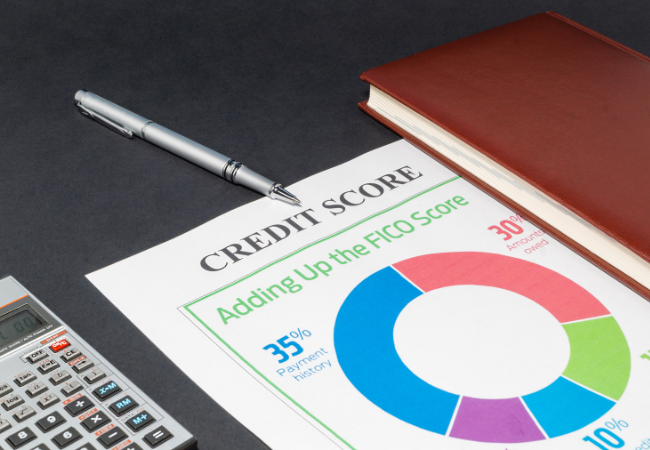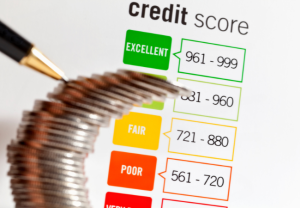A good credit score plays a crucial role in your financial health and opens doors to loan approvals and credit opportunities. Understanding what constitutes a good credit score is essential for managing your finances effectively.
According to industry standards set by FICO and VantageScore, a credit score ranging from 670 to 739 is generally considered good. Both credit scoring models use a range of 300 to 850 to assess creditworthiness.
It’s important to note that while these ranges provide a general guideline, individual lenders may have their own criteria for what they consider a good credit score.
Key Takeaways:
- A good credit score is crucial for financial stability and access to favorable loan terms.
- FICO and VantageScore are the two most widely used credit scoring models.
- A credit score of 670 to 739 is generally considered good.
- Each lender may have its own criteria for assessing creditworthiness.
- Regularly monitoring your credit score is essential for maintaining a good credit standing.
Understanding Credit Score Ranges
Credit scores play a crucial role in assessing an individual’s creditworthiness. Lenders and financial institutions rely on credit scores to determine the risk associated with lending money or extending credit. Understanding the different credit score ranges can provide valuable insights into your financial health and eligibility for various financial products.
There are two commonly used credit scoring models: FICO Score and VantageScore. Both models use a numerical range to categorize credit scores, allowing lenders to assess creditworthiness easily.
Credit Score Ranges
The following table illustrates the credit score ranges used by both FICO Score and VantageScore:
| Credit Score Range | Credit Score Category |
|---|---|
| 300-579 | Subprime Credit |
| 580-669 | Fair Credit |
| 670-739 | Good Credit |
| 740-799 | Very Good Credit |
| 800 and above | Excellent Credit |
Individuals with fair credit scores may face slightly higher interest rates or may qualify for loans and credit products with certain limitations. On the other hand, individuals with excellent credit scores are likely to enjoy lower interest rates, favorable loan terms, and increased approval potential for credit applications.
It’s worth noting that lenders may have their own specific criteria for evaluating credit scores and may consider additional factors beyond the credit score range. However, the credit score ranges provided by FICO Score and VantageScore offer a standardized framework for understanding creditworthiness.
Improving your credit score is possible with time and proper financial management. By maintaining responsible payment habits, minimizing credit utilization, and being mindful of your credit mix, you can work towards achieving a higher credit score. Regularly monitoring your credit score and addressing any discrepancies or errors can also help maintain and improve your creditworthiness.
Stay tuned for the next section, where we will explore the key factors that affect your credit score and provide actionable tips for improving and maintaining a healthy credit profile.
Factors Affecting Your Credit Score
Your credit score is influenced by various factors that lenders use to assess your creditworthiness. Understanding these factors can help you make informed decisions and take actions to improve your credit score over time. Here are the key factors that play a significant role in determining your credit score:
1. Payment History
Your payment history has the largest impact on your credit score. It accounts for 35% of your FICO score and carries significant weight in VantageScore as well. Lenders want to see a consistent track record of on-time payments. Late payments, defaults, and delinquencies can have a negative impact on your credit score.
2. Credit Utilization
Credit utilization refers to the amount of available credit you’re using. It’s important to keep this ratio low as it accounts for 30% of your FICO score. High credit utilization suggests that you may rely too heavily on credit and could be a higher risk for lenders. Aim to keep your credit utilization below 30% to maintain a healthy credit score.
3. Length of Credit History
The length of your credit history is another factor that lenders consider when evaluating your creditworthiness. This factor accounts for 15% of your FICO score. A longer credit history demonstrates your ability to manage credit over time. If you’re just starting out, it’s important to establish and maintain a good credit history to build a solid credit score.
4. Credit Mix
Having a diverse mix of credit accounts can positively impact your credit score. This factor accounts for 10% of your FICO score. Lenders want to see that you can handle different types of credit, such as credit cards, loans, and mortgages. However, it’s important to manage these accounts responsibly and not take on more credit than you can handle.
5. Recent Activity
Your recent credit activity, such as new credit applications or accounts, can impact your credit score. This factor accounts for 10% of your FICO score. Opening multiple new accounts within a short period of time can be seen as a sign of financial instability. It’s important to be mindful of your credit actions and avoid unnecessary credit inquiries or opening too many accounts at once.
| Factors | Impact on Credit Score |
|---|---|
| Payment History | Significant impact, largest factor |
| Credit Utilization | High impact, keep ratio low |
| Length of Credit History | Moderate impact, longer history is better |
| Credit Mix | Modest impact, diversify credit accounts |
| Recent Activity | Modest impact, avoid unnecessary inquiries |
By understanding these factors and taking proactive steps to improve them, you can work towards achieving and maintaining a good credit score. Building a solid credit history based on responsible credit management can open doors to better financial opportunities and borrowing options in the future.
Conclusion
Maintaining a good credit score is crucial for your financial well-being. A good credit score can open doors to better loan terms, lower interest rates, and increased access to credit. If you’re looking to improve your credit score, there are several steps you can take.
First and foremost, make sure to make your payments on time. Late payments can significantly impact your credit score. Keeping your credit card balances low is also important. High credit utilization can negatively affect your score, so aim to keep your balances below 30% of your available credit.
In addition, maintaining a mix of credit accounts can be beneficial. Lenders like to see that you can handle different types of credit responsibly. Strive for a healthy mix of credit cards, loans, and other lines of credit. Lastly, be mindful of applying for new credit too frequently. Multiple credit inquiries can raise red flags with lenders and potentially lower your score.
Lastly, regularly monitoring your credit score can help you stay on top of any changes or potential issues. There are various online tools and services that can assist you in monitoring your credit score. By keeping an eye on your score, you can address any discrepancies or fraudulent activity promptly and take the necessary steps to rectify them.
By following these credit score tips, you can work towards achieving and maintaining a good credit score. Remember, building and improving your credit score takes time and diligence, but the benefits are well worth it in the long run.



